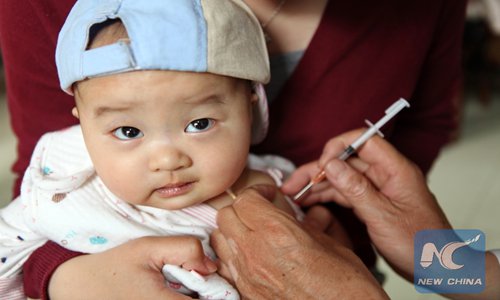China faces ‘severe’ rabies vaccine shortage
By Huang Lanlan Source:Global Times Published: 2020/6/10 0:15:41

(photo: Xinhua)
A shortage of the rabies vaccine in China is causing rising public concern as the recent number of cases of humans being hurt by dogs and cats has surged with the increasing temperatures, observers found.Several provinces across China, including northern Hebei and Shanxi, eastern Anhui, southwestern Sichuan and Yunnan, face a "severe lack" of rabies vaccine stocks amid the novel coronavirus (COVID-19) pandemic, China Central Television (CCTV) reported on Monday.
Li Jinsui, a resident of a county in Hebei Province, said she was unable to get her third shot of the rabies vaccine because of a local shortage of supply.
Li was scratched by her cat on May 31. When she got the first and second vaccine shots at a hospital in her county, she was told by medical workers to "look for the third shot by herself" as local rabies vaccine supplies were seriously scarce.
"I made calls to all the nearby counties, and most of them said they didn't have it either," Li told the Global Times Tuesday. "One county even told me there had been a shortage (of rabies vaccine supplies) for five months."
Li, who was scheduled to get the third short on June 6, eventually got it on Monday in Central China's Hunan Province, which is more than 1,000 kilometers away from Hebei.
The vaccine shortage is the result of the pandemic and a stricter vaccine supervision mechanism, industry insiders said.
The outbreak of the deadly COVID-19 pandemic has overwhelmed many small vaccine manufacturers who suffered big financial losses in the months of production suspension, said Jiang Zhaohua, director of the emergency department at Shanghai Punan Hospital.
China started to implement a new vaccine administration law in December 2019, which requires producers to get approval from related testing institutes before selling their vaccine products on the market, said a rabies vaccine company in Central China's Henan Province.
"Some producers, especially smaller ones, are therefore reluctant to make vaccines under the pressure of time and funding costs," Jiang told the Global Times Tuesday.
Worse still, demand for the rabies vaccine has dramatically increased in recent days since early summer is a peak season of humans being attacked by cats and dogs, which tend to be more irritable in hot weather, Jiang added.
The hospital that Jiang works for has Shanghai's largest dog-related injury outpatient department. The department has been serving an average of 300 patients each day since May, a 20-25 percent rise from April.
Hydrophobia, or rabies, is highly dangerous with a nearly 100 percent fatality rate. The vaccine is the only method to prevent the deadly disease, Jiang said.
The rabies vaccine shortage is just a temporary problem which will be improved before long, Jiang estimated. "It's a matter of life and death," he added.
Chinese authorities are speeding up the approval of rabies vaccine products. The Global Times found that between May 25 and 31, the National Institutes of Food and Drug Control approved 3.02 million bottles of rabies vaccine produced by five domestic drug makers to enter the market, 18 times that in the similar period last month (April 27 to May 3).
China is one of the world's biggest rabies vaccine users. About 15 million people in the country are bitten or scratched by cats and dogs each year, according to statistics from the Chinese Medical Association.
Posted in: SOCIETY